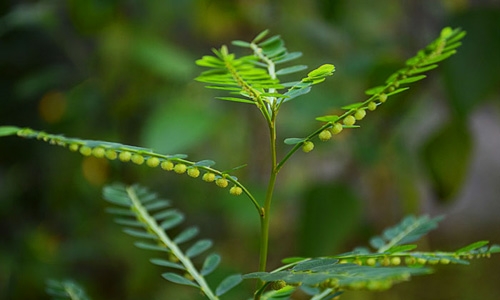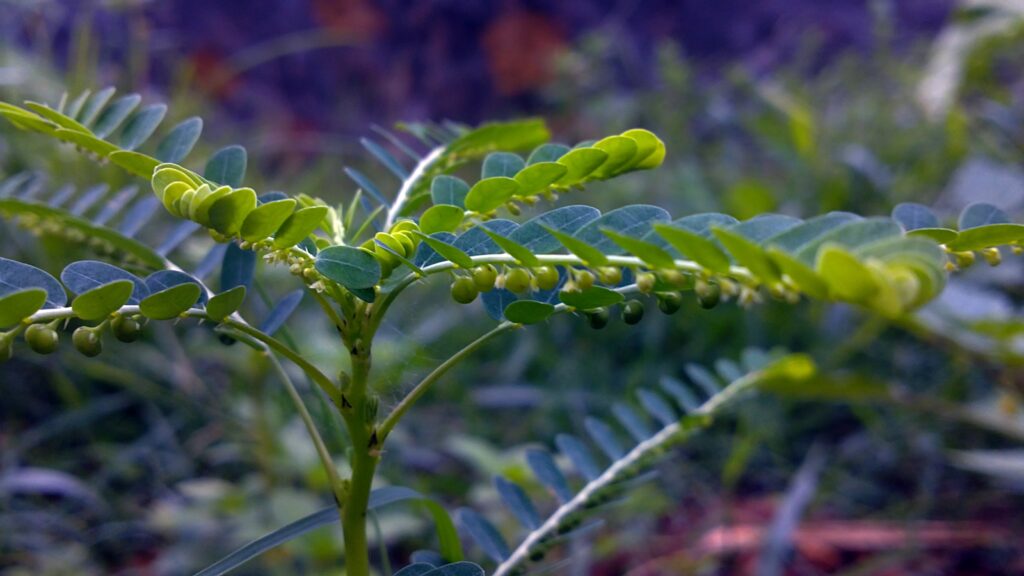India is a paradise of medicinal plants. In India, large number of plants have been used in Ayurvedic practice since thousands of years ago. Various researches have proved the efficacy of medicinal plants for the long- term health benefits.

One such plant is Bhumyamalaki (Phyllanthus niruri) which has been used in India since ages for various health issues. In Sanskrit, it is known by the name Bahupatra and Tamalaki. In various scientific researches, a large number of compounds of different functional groups which are of prime health importance are found in different varieties of Bhumi amla.
Phyllanthus niruri is commonly known as stone-breaker plant. This plant is commonly known as Bhumyamalaki in India. It belongs to the family Euphorbiaceae. It is useful for the treatment of liver disorders, inflammation, spleen, skin diseases etc.
Medicinal properties of Phyllanthus niruri are:
- Rasa (Taste): Kashaya (Astringent), Madhura (Sweet) and Tikta (Bitter)
- Potency: Cold
- Undergoes sweet taste conversion after digestion.
- Effect on Tridosha: reduces vitiated pitta and kapha dosha.
- Part used: Whole plant
Health Benefits of Phyllanthus niruri are:
- Rochak – It improves appetite and hence useful in anorexia.
- Pittashamak – This herb is also recommended in bleeding disorders such as nasal bleeding, menorrhagia (heavy and prolonged menstrual bleeding).
- Shwashari – It is also indicated in the treatment of chronic respiratory disorders like asthma.
- Pittamehahara – Phyllanthus niruri is also useful in the treatment of diabetes with pitta dominant.

- Effect on Liver: Due to the anti-oxidant and hepatotoxic properties of Bhumiamla, it is useful for the treatment of liver disorders. It is used in various Ayurvedic formulations for nourishing the liver and for improving hepatic functions.
• The fresh root of Bhumiamla is believed to be an excellent remedy for jaundice, dropsy etc. For jaundice, the juice of the plant of Bhumiamla is recommended.
• This herb also protects the lining of stomach against the damage caused by excessive gastric acid secretion.
• It has an excellent effect on Pitta disorders and therefore it is also useful in the treatment of acidity.
• In the case of over dose of paracetamol, it leads to hepatoxicity same as viral infection. It has been found that the protein which is found in this plant corrects the liver metabolism and reduces the levels of anti-oxidant enzymes.
• For Hepatitis B, this plant has been used as a natural remedy since thousands of years. - Effect on Kidney: The incidence of urinary stones has been increasing over the last years. The diuretic property of bhumiamla helps in reducing the risk of formation of kidney stones.
• It promotes the elimination of stones in kidney patients in a natural way.
• This herb also normalizes the calcium levels in hypercalciuric patients. In India, it is a popular remedy for kidney stones and gall stones.
• It is also administered as a diuretic.
• The combination of bhumi amla with other herbs is an excellent remedy for all kinds of kidney disorders. - Diabetes: The common complication of diabetes is diabetic neuropathy. There is an involvement of Vata and Pitta disorders in diabetic neuropathy. This plant has the possibility to pacify both these doshas.
• Due to the tikta (bitter) property of bhumiamla, it helps to manage blood sugar levels and protects from the complications of diabetes.
• It is also very useful in calming down the nerves due to high blood pressure.
• The juice of bhumi amla extract helps in preventing glucose absorption and maintains healthy blood sugar levels. - Skin Disorders: The tikta (bitter) property of bhumi amla acts as a blood purifier and balances Pitta dosha in the body.
• The paste prepared from the leaves of Bhumi amla can be applied on the skin for skin rashes and boils.
• The poultice of leaves helps to cure skin ulcers, itching and swelling. - For improving overall health: It is a highly potent herb in Ayurveda. The juice obtained from the leaves of bhumi amla acts as a general tonic. This juice improves stamina, vitality and helps in boosting overall strength of the body. It rejuvenates the whole body.
• In pregnancy and breast feeding, the use of Phyllanthus niruri is contraindicated. Consult your Ayurveda expert.
• Being coolant in nature, it can increase Vata dosha if used in high doses.
• People with diarrohoea and dysentery should avoid the use of Phyllanthus niruri.
Disclaimer:-
This article is not a substitute to the standard Medical Diagnosis or personalized Ayurvedic Treatment! It is intended only for Information!
For experts consultation, please write us at care@blessayurveda.com.
3,578 total views, 4 views today